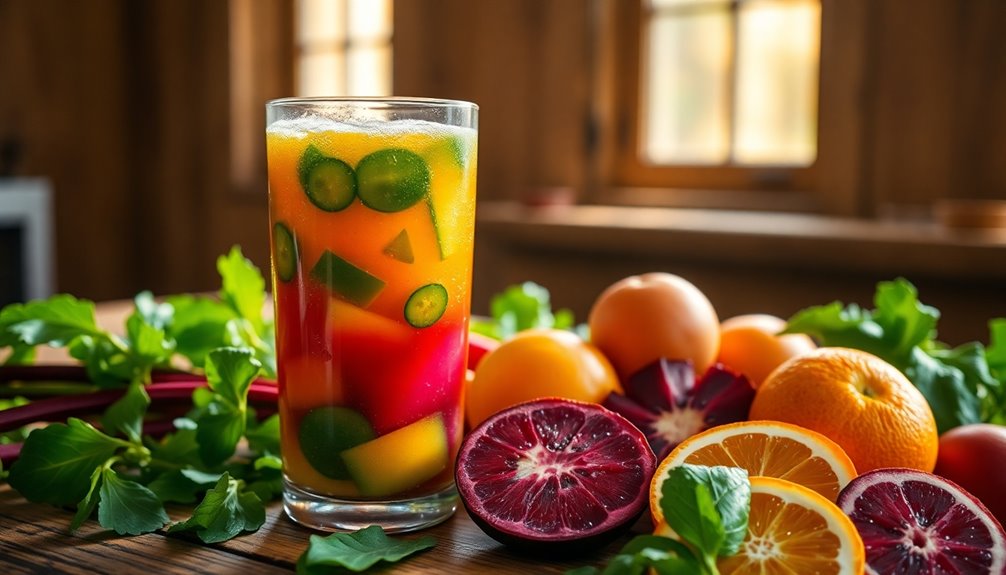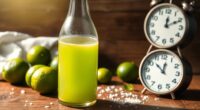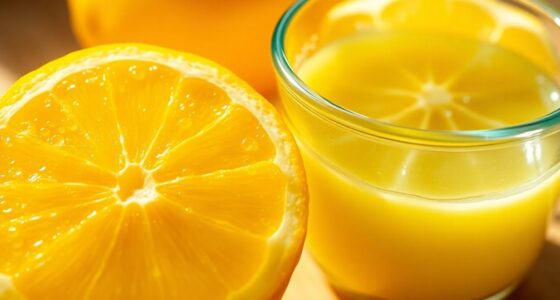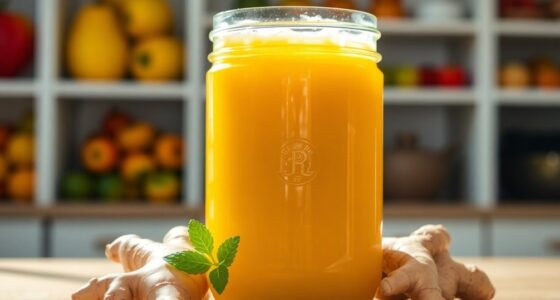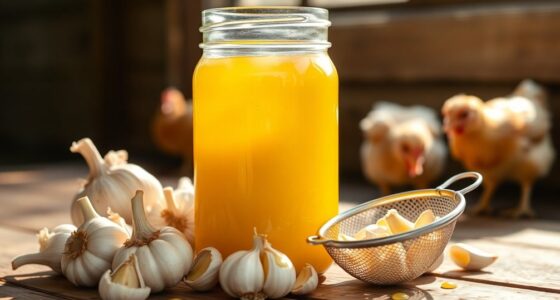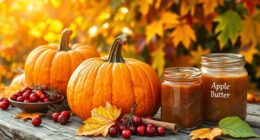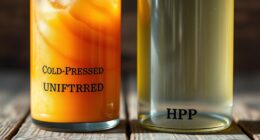Freshly juiced juice is good for about 3-5 days in the fridge. If you use a centrifugal juicer, expect it to last only 24 hours due to faster oxidation. Masticating juicers can keep juice fresh for around 48 hours, while twin gear models maintain quality for 4-5 days. For optimal freshness, store your juice in airtight glass containers in the coldest part of your fridge. Curious about how to maximize your juice's lifespan? There's more to learn!
Key Takeaways
- Fresh cold-pressed juice typically lasts 3-5 days in the refrigerator, with quality declining over time.
- Centrifugal juicers yield juice that lasts about 24 hours due to faster oxidation.
- Masticating juicers can keep juice fresh for about 48 hours, while twin gear juicers extend freshness to 4-5 days.
- Freezing fresh juice can preserve it for 12-16 months, though fresh consumption is recommended for maximum health benefits.
- Always check for off appearance or smell in older juice to ensure safety before consumption.
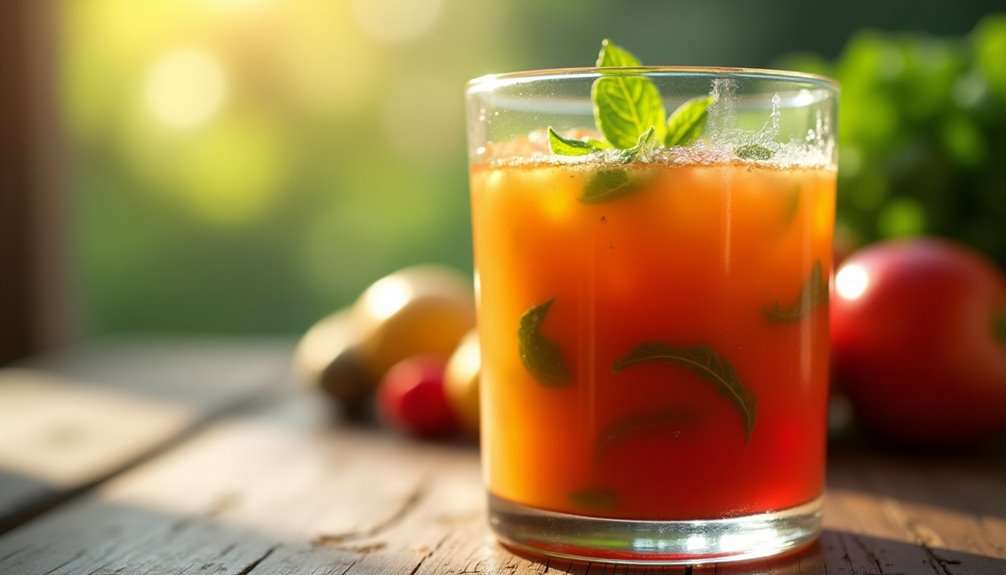
When you whip up a batch of fresh juice, it's important to know how long it'll stay good, especially if you want to enjoy every nutrient-packed sip. Fresh juice, whether made with a masticating juicer or a centrifugal one, has varying shelf lives. The way you store it plays a crucial role in how long it remains fresh and nutritious.
Typically, freshly made cold-pressed juice lasts about 3-5 days when stored properly in the refrigerator. Some sources even suggest it can last up to a week, but quality tends to decline over time. If you're using a centrifugal juicer, though, your fresh juice will only last about 24 hours. This is due to quicker oxidation that occurs with this type of juicer.
On the other hand, masticating juicers are better at preserving juice quality, extending freshness to around 48 hours. Even better are twin gear juicers like the Greenstar Elite, which can maintain juice freshness for 4-5 days, thanks to their superior protection against oxidation.
To maximize the shelf life of your fresh juice, proper storage techniques are essential. Using airtight glass containers is one of the best ways to keep your juice fresh. Glass containers minimize air exposure, which is crucial since oxygen can lead to oxidation and nutrient loss.
If you want to extend your juice's longevity even further, consider freezing it. Freezing juice can prolong its shelf life to an impressive 12-16 months with minimal nutrient loss. Just remember that while frozen juice can be a convenient option, fresh consumption is always recommended for optimal health benefits, particularly due to the nutritional advantages it provides.
When you store your fresh juice, make sure to fill the glass containers to the top to reduce the amount of air in the container. If you're dealing with smaller amounts, using smaller containers can also help in minimizing air exposure. Additionally, keeping your juice in the coldest part of the fridge can help maintain its quality.
As you enjoy your fresh juice, it's good to remember that the first few days post-juicing are when the flavor and nutrients are at their peak. After that initial period, you may notice a gradual decline in taste and nutrient density.
Always do a quick visual and smell check before consuming older juice; if it looks or smells off, it's best to err on the side of caution and dispose of it.
Frequently Asked Questions
How Long Can You Keep Juice After Juicing?
After juicing, you can keep your juice for varying lengths of time depending on the juicing method you used.
If you used a centrifugal juicer, it'll stay fresh for about 24 hours.
Masticating juice lasts up to 48 hours, while cold-pressed juice can last anywhere from 3
What Is the 80/20 Rule for Juicing?
The 80/20 rule for juicing suggests you should aim for 80% vegetables and 20% fruits in your juice.
This balance helps maximize nutrient intake while keeping sugar levels in check. By focusing on nutrient-rich veggies like kale and spinach, you'll enhance the health benefits of your juice.
You can adjust this ratio based on your goals, but sticking to the 80/20 guideline promotes a healthier, more delicious juicing habit overall.
How Long Can Freshly Squeezed Juice Last in a Mason Jar?
When you store freshly squeezed juice in a mason jar, it can last about 2-3 days in the fridge if you use a centrifugal juicer, or up to 48 hours with a masticating juicer.
To keep it fresh, fill the jar as much as possible to limit air exposure. An airtight seal helps lock in flavor and nutrients, while high-acid fruits, like citrus, can stretch that freshness a bit longer.
How Long Are Nutrients Good After Juicing?
After juicing, nutrients start to degrade quickly due to oxidation.
You'll get the most benefits if you drink your juice right away.
If you store it properly in a vacuum-sealed container and keep it refrigerated at or below 41°F (5°C), cold-pressed juice can last up to 48 hours, while centrifugal juice usually lasts only about 24 hours.
Adding citrus can help preserve some nutrients for a bit longer, too.
Conclusion
In conclusion, freshly juiced juice is like a vibrant sunset—beautiful but fleeting. To enjoy its peak flavor and nutrients, drink it within 24 to 72 hours, depending on storage conditions. Always store your juice in an airtight container in the fridge to slow down oxidation. Remember, the fresher the juice, the better the taste and health benefits. So, sip it up while it's still bursting with life!
Cindy thoroughly researches juicing trends, techniques, and recipes to provide readers with practical advice and inspiration. Her writing style is accessible, engaging, and designed to make complex concepts easy to understand. Cindy’s dedication to promoting the advantages of juicing shines through her work, empowering readers to make positive changes in their lives through the simple act of juicing.

